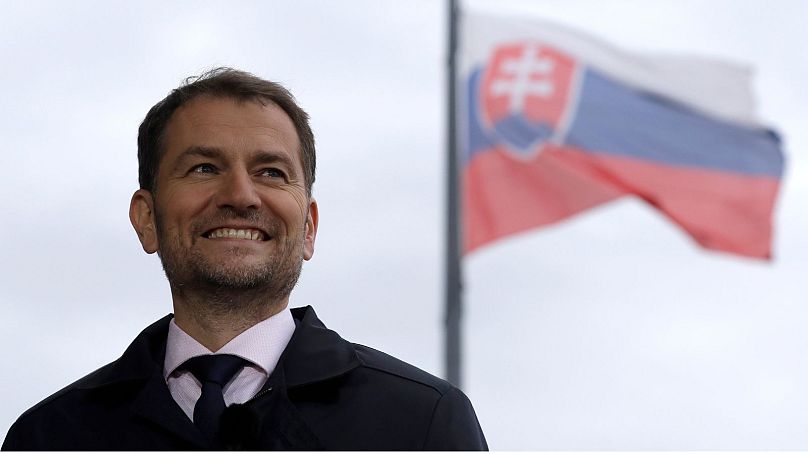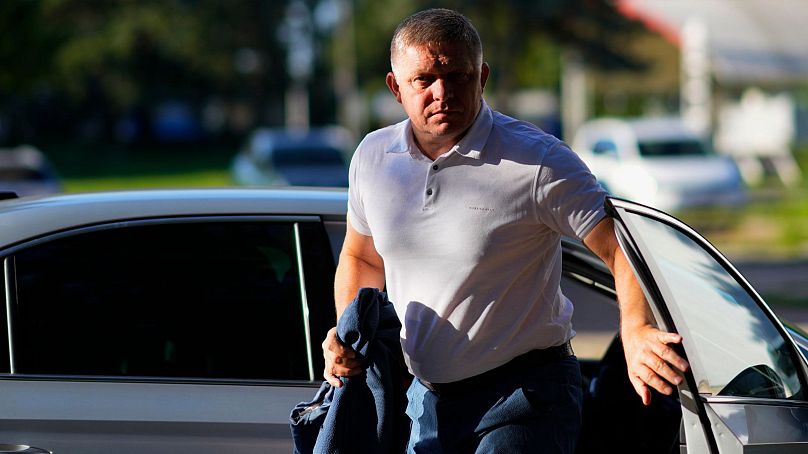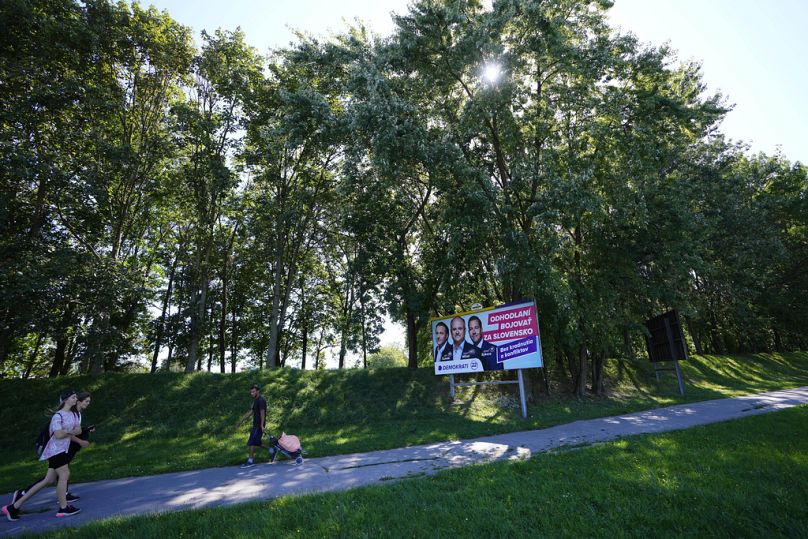One of the main contenders in Saturday's vote has pledged to reverse the country's support for Ukraine as it battles Russia.
Slovaks head to the polls on Saturday.
 ADVERTISEMENT
ADVERTISEMENT
 ADVERTISEMENT
ADVERTISEMENT
The country's early parliamentary pits populist former Prime Minister Robert Fico, who campaigned on a clear pro-Russia and anti-American message, against a liberal pro-West newcomer.
Fico and his leftist Smer (Direction) party have vowed to reverse Slovakia's military support for neighbouring Ukraine if he returns to power.
Slovakia’s vote is a key test that could put the country on a new course away from Kyiv and towards Moscow, threatening to break a fragile unity within the European Union and NATO.
Fico’s main challenger is the relatively new liberal, pro-Western Progressive Slovakia. The winner of the vote traditionally gets the first chance to create a government.
A total of 150 seats in the Parliament are up for grabs on Saturday.
How did we get here?
The populist Ordinary People party won the 2020 election with an anti-corruption ticket.
Its leader Igor Matovič struck a deal to govern with the pro-business Freedom and Solidarity party, the conservative For People party, and another populist group, We Are Family.
The coalition collapsed in December after losing a parliamentary no-confidence vote.
This was the latest step in a long-running political crisis caused by bickering among the coalition partners over a number of issues, such as the state's COVID response and how best to tackle soaring inflation.
The government lost its parliamentary majority after Freedom and Solidarity withdrew from it in September 2022 last year and requested a no-confidence vote.
The coalition was a staunch supporter of Ukraine, donating arms to Kyiv's army while opening its border to allow in Ukrainian refugees fleeing the war with Russia.
Slovakia is currently headed by a caretaker government.
An eastward turn?
Fico, 59, opposes EU sanctions on Russia, questions whether Ukraine can force out the invading Russian troops and wants to block Kyiv from joining NATO.
He proposes that instead of sending arms to Ukraine, the EU and the US should use their influence to force Russia and Ukraine to strike a compromise peace deal.
His return to power could lead Slovakia to abandon its democratic course in other ways, following the path of Hungary under Prime Minister Viktor Orbán and to a lesser extent of Poland under the Law and Justice party.
“War always comes from the West,” Fico said at a rally. “And freedom and peace always come from the East.”
Fico repeats Russian President Vladimir Putin’s unsupported claim the Ukrainian government is a Nazi state that threatens Russians.
Ukrainian President Volodymyr Zelenskyy is Jewish and lost relatives in the Holocaust.
Known for foul-mouthed tirades against journalists, Fico campaigned against immigration and LGBTQ+ rights.
He has threatened to dismiss investigators from the National Criminal Agency and the special prosecutor who deals with the most serious crimes and corruption.
After Smer lost the 2020 vote, the four-party coalition made fighting corruption a key focus.
Dozens of senior officials, police officers, judges, prosecutors, politicians and business people - many linked to Smer - were convicted of corruption and other crimes.
Fico himself faced criminal charges last year for creating a criminal group and misuse of power.
The Western-minded challenger
Progressive Slovakia sees the country’s future firmly in the EU and NATO.
The party vowed to continue backing Ukraine and is a rare example in the conservative Roman-Catholic country that is in favour of LGBTQ+ rights.
Popular among young people, the party won the 2019 European Parliament election in Slovakia in coalition with the Together party after gaining more than 20% of the vote.
But it narrowly failed to win parliamentary seats in the 2020 ballot.
The party is led by Michal Simecka, a European Parliament vice-president.
Liberal President Zuzana Caputova was deputy head of the party before running for president. After trailing Smer in second place, some of the latest polls show that Progressive Slovakia's support is surging and fighting neck and neck with Smer for the lead.
What's going to happen?
No party is expected to win a governing majority and a coalition government will likely need to be formed.
Fico said he hopes to join forces with Hlas, or the Voice, which is expected to finish in third place. It's led by Peter Pellegrini, Fico's former deputy at Smer.
Pellegrini replaced Fico as prime minister after he was forced to resign by the major anti-government street protests following the 2018 slayings of journalist Jan Kuciak and his fiancee.
The two parted ways after the 2020 election loss.
Two other anti-West forces remain in hand for Fico’s possible coalition.
The Republic is a far-right group that might finish fourth, according to some polls.
It is led by former members of the openly neo-Nazi People’s Party Our Slovakia whose members use Nazi salutes and want Slovakia out of the EU and NATO.
Its possible participation in the government could send shockwaves through Europe.
The ultranationalist Slovak National Party is the other anti-Western party.
Four other political groups and parties might surpass the 5% threshold necessary to win parliamentary seats. Their results will be key to determining the chances of Smer, or Progressive Slovakia, to form a ruling coalition.













